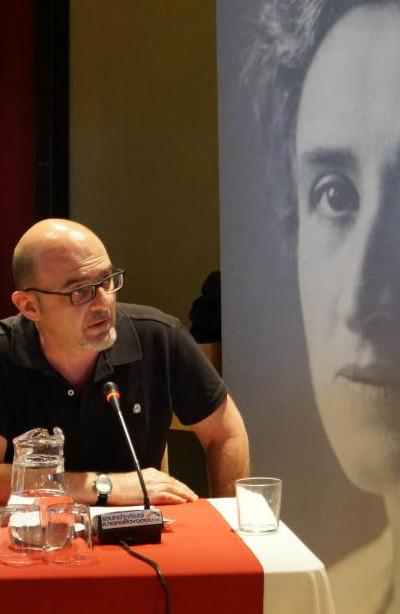Polymeris Voglis is Associate Professor and Director of Prostgraduate Studies, Department of History, Archaeology and Social Anthropology, University of Thessaly. He studied history at the University of Athens and the European University Institute. He has published the books Becoming a Subject. Political Prisoners during the Greek Civil War (New York, 2002), The Greek Society in the Occupation, 1941-1944 (in Greek, 2010), and The Impossible Revolution – The Social Dynamics of the Greek Civil War (in Greek, 2015). His research interests concern the 20th century social history, the Occupation and the Greek Civil War, and postwar history. He is also among the main organizers of the “Rethinking Europe” project, supported by the Rosa Luxemburg Stiftung and the Athens-based “Defense of Society and Democracy” initiative.
Polymeris Voglis spoke to Rethinking Greece* on the Greek 40’s, social inequalities, democracy and the fragility of Europe:
The Greek 40’s have been the focus of your research as well as an arena of intense public history debates in Greece for some time. Why does this particular period attract so much attention nowdays?
Τhe 1940s is one of the most important periods in modern Greek history, one that shaped the developments in Greek society and politics for at least forty years after the end of the Greek civil war in 1949. It is impossible to understand the military dictatorship (1967-74) or the political culture of the 1970s if you don’t take into account what happened during the Nazi occupation and the civil war. For that reason the history of the 1940s has always attracted the interest of a wider public in Greece. What has changed is that in the last 20 years a considerable number of scholars started to study this particular period and to debate in public about the 1940s and that fuelled the interest of the wider public. The intense public history debates show that the 1940s is still relevant for the contemporary political identities; both the Left and the Right need to have a narrative for the 1940s.
You refer to the Greek civil war (1946-49) as a “revolution”. Can you tell us why? Can we study the civil war as a part of Global / European history of revolutions?
The Greek Civil War was a violent conflict that concerned the future of Greece. I used the term “revolution” because the goal of the Greek Communist Party after 1947 was the radical transformation of the society and the establishment of a socialist regime in Greece. In my book, I argue that the Communist Party had not set this goal from the beginning, that is in the Resistance movement in occupied Greece, but gradually and with many reservations decided to engage in a military struggle. The decision to follow the revolutionary path was a result of the ruthless persecution of the Left by the royalist-Right in the post-liberation era, of the culture of armed struggle that was developed in the Resistance, and of the establishment of socialist regimes in the Balkans. The civil war was intertwined with revolution, and this is not a Greek phenomenon, in fact this happened in many countries, like in Russia, China, Cuba, Nicaragua, and elsewhere. From this viewpoint, the Greek civil war belongs to the revolutionary tide that swept Europe, Asia and Latin America in the 20th century.
Social inequalities and political autocracy have characterized Southern European countries from the 1930’s until the 1980’s. What are the consequences for today’s political situation and dilemmas?
The postwar “miracle” in Europe was based on the welfare state and an “inclusive” societal model. The demise of the welfare state in the last decades has led to an “exclusive” model. More and more people are excluded; they are unemployed or only temporary employed, have no health-care and insurance, live in impoverished neighborhoods, etc. We need to realize that social inequalities are not only a social and economic problem but a political problem as well. To put it bluntly, the ever growing social inequalities put democracy at risk. This can happen in two ways. On the one hand, governments facing social discontent and protest become increasingly more repressive. Instead of putting forward reforms that would improve people’s lives regarding employment, health care, education, etc., government policies are restricted to monitoring and policing the “excluded”. On the other, many of the “excluded”, disappointed by the political elites look for a “strong man” to save them from their predicament, or put the blame on immigrants and refugees, lending their support to xenophobic and extreme-right wing parties. These developments are very dangerous for democracy.
 “Rethinking Europe” is an ongoing project and a series of lectures on Europe’s future organized by the Rosa Luxemburg Stiftung and the Athens-based “Defense of Society and Democracy” in which you actively participate. What is its main concept?
“Rethinking Europe” is an ongoing project and a series of lectures on Europe’s future organized by the Rosa Luxemburg Stiftung and the Athens-based “Defense of Society and Democracy” in which you actively participate. What is its main concept? The initiative to organize these lectures started a year ago, after the January 2015 elections. These elections had sent a very clear message against the prevailing neo-liberal policies, the austerity measures and the demise of the welfare state in the EU. The idea behind the Rethinking Europe project was to open the discussion about the consequences of these policies on the peoples of Europe and on the future of Europe as well. We should not take the unification of Europe for granted and the recent developments regarding the refugee crisis (closing of borders, refusal to receive refugees, plans for revising the Schengen treaty, etc.) demonstrate how fragile the EU is. The future of Europe is dependent on the idea of what kind of Europe do we want. If current policies drive Europe into a dead-end, then we should put forward an alternative vision for Europe and for that purpose we organize a series of lectures that will go until the summer.
In what terms can we re-think Greece and Europe after the Syriza government July 2015 compromise?
Many people say that the July compromise was a defeat of the Syriza government. I think that it was a defeat of democracy in Europe. Greek people voted against the austerity in January 2015 and again in the July referendum. The EU ignored the vote of the Greek people and imposed a new austerity program threatening that otherwise Greece would be forced out of the EU. If the EU ignores the will of the people, then what can be the future of democracy in Europe? If the policies, decisions, measures are fixed and set in advance, then what is the point of doing elections? In the past there was the discussion about the “democratic deficit” in Europe. We passed that point. The July compromise showed that the neoliberal orthodoxy is stronger than democracy. This is a good reason to start rethinking what Europe has become and how it should be.
*Interview by Nikolas Nenedakis
Watch video: “Rethinking Europe – Lecture 01 Saskia Sassen – Greek Crisis: Norm or Exception in Europe?” (June 2015)













